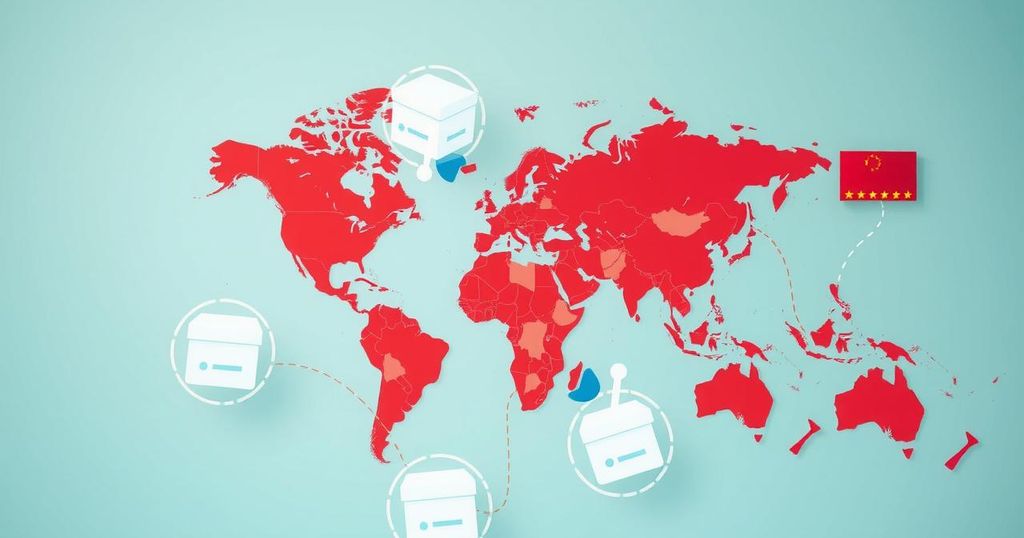Global Elections of 2024: A Year of Political Shifts and Challenges

In 2024, nearly half of the world’s population engaged in elections, resulting in significant political changes, like Donald Trump’s return in the U.S. and Modi’s coalition government in India. Europe’s political landscape faced challenges, including a fragmented parliament in France and Labour’s rise in the UK. Meanwhile, Latin American elections revealed ongoing corruption issues, particularly in Venezuela, and South Africa’s ANC confronted challenges after losing majority rule, highlighting a tumultuous electoral year with lasting global implications.
In 2024, approximately half of the global population participated in elections, leading to significant shifts in political landscapes across various nations. In South Africa and India, ruling parties encountered diminished support amid concerns over corruption and democratic erosion. European nations experienced a rise in far-right party popularity, while both France and Germany faced governmental upheaval. In the United States, Donald Trump triumphantly returned to political prominence. As the year concludes, these electoral developments are poised to influence international geopolitics for years to follow.
In the United States, Donald Trump’s reelection on November 5 signified a remarkable political comeback. Trump, who previously disputed the 2020 election results and dealt with numerous legal challenges, secured a decisive victory by championing public discontent relating to the economy and immigration issues. Analysts suggest that Trump’s victory reflects a Republican Party gaining traction among non-college-educated voters, traditionally Democratic constituents. Trump’s associates believe he is now better positioned to pursue a more ambitious agenda due to a Republican-controlled House and Senate.
Regarding Asia, Prime Minister Narendra Modi’s party in India anticipated a landslide victory, yet ultimately faced a setback, forming a coalition government instead. This change is viewed as a positive development for democracy amid concerns over Modi’s authoritarianism. In Indonesia, Prabowo Subianto’s election witnessed a troubling backdrop of alleged electoral irregularities, challenging his future relationships with both China and the United States.
In Europe, France grappled with political turmoil after President Macron called for a snap election, resulting in a fragmented parliament where neither extreme left nor right factions secured control. The instability risks hampering France and Germany—the European Union’s leading economies—from addressing pressing issues such as support for Ukraine. Meanwhile, the UK witnessed the Labour Party assume power after a protracted Conservative rule, yet faces dissatisfaction from the public regarding new Prime Minister Keir Starmer’s responses to national challenges.
In Latin America, Mexico elected Claudia Sheinbaum as its first female and Jewish president, maintaining her predecessor’s left-leaning policies amidst criticism regarding judicial reforms. Notably, Venezuela’s recent election concluded with Nicolás Maduro declaring victory under dubious conditions, raising international concerns over electoral integrity. In South Africa, following electoral losses, the ANC party had to collaborate with rival parties to forge a coalition, confronting numerous domestic issues, including poverty and unemployment.
The elections of 2024 represent a pivotal moment in global democracy, wherein a significant proportion of the world’s population was engaged in the electoral process. This period was marked by a variety of outcomes ranging from political comebacks to unforeseen governmental instability across different regions. The developments in nations such as the United States, India, Indonesia, France, the UK, Mexico, Venezuela, and South Africa reveal the dynamic nature of contemporary political landscapes, underscoring emerging challenges and transformations across these countries.
The electoral events of 2024 highlight a complex and shifting political milieu worldwide. With significant victories and defeats across various nations, the implications for international relations and domestic governance are profound. The changes observed, particularly concerning political shifts in the United States, emergent coalitions in India and South Africa, and regional instability in Europe and Latin America, suggest a period of potential transformation that may reshape global geopolitical dynamics for years to come.
Original Source: www.semafor.com








